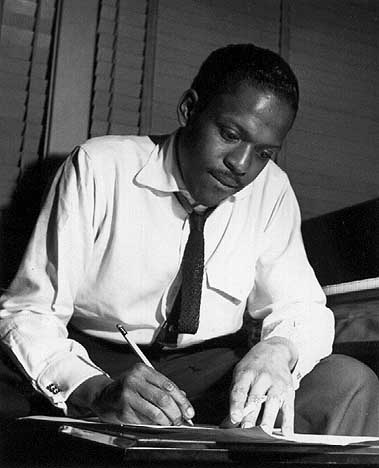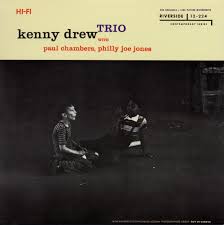Weirdo – Kenny Drew, Sr.
Despite the title, this classic uptempo hard bop song is not particularly weird. The solo form, however, is quite different from that of the head. Kenny Drew's piano melody and solo transcriptions are available.
- Recording: Kenny Drew - Kenny Drew Trio
- Recorded on: September 20, 1956
- Label: Riverside (RLP 12-224)
- Concert Key: C minor
- Vocal Range: , to
- Style: Swing (uptempo)
- Piano - Kenny Drew
- Bass - Paul Chambers
- Drums - Philly Joe Jones
Purchase Weirdo - Kenny Drew
Purchasing this song through our affiliate links with certain retailers provides jazzleadsheets.com with additional support to help keep us bringing you the best lead sheets available. Thank you!
Video
- Description
- Historical Notes
- Solos
- Piano Corner
- Bass Corner
- Drum Corner
- Guitar Corner
- Inside & Beyond
- Minus You
Another possibility for the title's origin is Philly Joe Jones' rhythms on the first three measures of the A and C sections of the head: a Latin groove in quarter-note triplets, essentially a half-time 12/8 feel. This does not line up easily with the melody and bass figures, and is not notated in the lead sheet. Philly Joe catches the hits at the end of the third measure and leaves the fourth measure as a break.
Kenny Drew's Weirdo was recorded again four years later, on tenor saxophonist Charlie Rouse's first album as a leader, "Takin' Care Of Business." This version is faster, with no interlude and with the solos on the same form as the head.
Kenny's melodic lines have a unique flowing quality, but also a bounce that fits perfectly in the groove. Small accent marks in this transcription indicate the phrasing that produces the bouncing quality.
Check out the Piano Corner tab for Drew's piano melody transcription.
Piano Solo Transcription: Click on the Solos tab for information about his transctibed solo.
Related Songs
Email Send Weirdo to a friend

Kenny Drew, Sr.
August 28, 1928 – August 4, 1993
Kenny Drew was born in New York City. He studied classical piano but soon turned to jazz. His recording career started in 1950 at age 22, first with Howard McGhee for Blue Note, then Sonny Stitt for Prestige. These two 1950 recordings plus a surviving radio broadcast with Charlie Parker (December 8, 1950) put him in the company of jazz greats J.J Johnson, Max Roach and Art Blakey. Read more...

